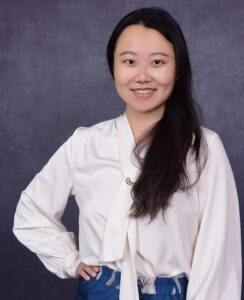
Name: Abby Youran Qin
Abby Youran Qin, a Ph.D. student in the SJMC, received the Top Student Paper Award from the Association for Education in Journalism and Mass Communication (AEJMC). AEJMC is a nonprofit organization that supports excellence in journalism and mass communication education. Qin’s research was recognized by the AEJMC’s Political Communication Division, focusing on how media shapes politics, public opinion, campaigns, and democratic participation.
Qin’s paper, “What Does the Ideal Democracy Look Like? News Use, Democratic Dissatisfaction, and Alternative Political Processes,” examines the influence of right-wing media on political attitudes in the United States. She finds that both Democrats and Republicans feel more ideologically represented when their media use leans right. Qin argues that this media framing plays a powerful role in shaping and reinforcing broader political discourse. Here, she reflected on what the award meant to her, shared insights from her academic journey, and offered advice to fellow researchers.
Winning the Top Student Paper Award from the AEJMC is a big achievement; what part of this accomplishment makes you the proudest?
Honestly, I’m proudest of starting the project in the first place. When I first read Stealth Democracy by Elizabeth Theiss-Morse and John R. Hibbing, something didn’t sit right with me. They argue that most Americans want to opt out of politics and would gladly leave decision-making to experts. That felt dismissive. I’ve always believed that people actually want more democracy, not less.
That belief drove me to dig deeper. I found that many Americans do, in fact, prefer more participatory forms of governance — like referenda and mutual aid — over stealthy, expert-led decision-making. That was the hopeful part. The more sobering finding was how profoundly extreme right-wing media influence how people feel about the political system—even those who disagree with the content. Both left- and right-leaning audiences internalize a framing that centers on culture wars while overlooking the deeper structural crises of capitalism.
At times, it feels like we’re living in a Star Wars scenario: the Galactic Republic is quietly turning into an empire, but all our attention is still fixated on the Separatists. The tension between the desire for deeper democracy and the distractions engineered by the media system is what I hope to illustrate.
What advice would you give SJMC students hoping to pursue high-level academic research?
Do research that really excites you. I’ve gotten way more rejections than acceptances or awards, and I actually got another rejection just a week after this award! Awards are nice, but they won’t keep you going. Passion will. If you care about your topic, it’s a lot easier to stick with it through the ups and downs.
What is your favorite SJMC memory?
There are honestly too many. I still remember running into Xiaoya on the street. She was juggling five bags of groceries, and I was crying over a breakup. She immediately dropped everything, took me to get bubble tea, and just sat and listened. She even offered to let me stay over at her place if I didn’t want to be alone.
When my partner and I moved across town and couldn’t afford hiring a moving company, Danny helped with all the heavy lifting, drove the giant U-Haul for us, and even offered to take care of our cat, Brunch, over the summer. She said Brunch is our family, so she’s always welcome in her house.
Most recently, my J202 students gave me the sweetest gifts at the end of the semester, including a postcard that said, “MADISON, Wis. — Abby Qin is the best 202 TA ever, according to Lab 308.” (And yes, they got the AP style right!) These moments remind me of how lucky I am to be here.
Why did you choose the SJMC?
It was actually the only offer I got. Like I said, I’ve had way more rejections than acceptances. But I’ve learned that the ones that do say yes often end up being the best fit. That’s definitely been the case with SJMC. I’ve grown so much here, as a researcher, as a teacher, and as a person.